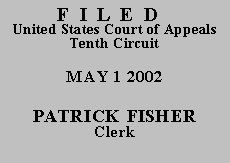

| CHARLES WESLEY MATHES, JR., |
|
| v. | |
| JAMES SAFFLE, |
Charles Wesley Mathes, Jr., a state prisoner proceeding pro se, requests a certificate of appealability ("COA") to appeal the denial of his 28 U.S.C. § 2241 petition. Mr. Mathes fails to make a substantial showing of the denial of a constitutional right, and so we deny a COA and dismiss the appeal.
I. Background
In 1980, Mr. Mathes was convicted in Oklahoma on state charges and sentenced to a term of imprisonment not to exceed thirty-two years. In 1986, Mr. Mathes was released on parole for that conviction. In 1991, the Oklahoma Department of Corrections (the "ODOC") revoked Mr. Mathes' parole for the 1980 conviction because of parole violations, including his subsequent convictions on other, unrelated charges. The ODOC filed a detainer such that Mr. Mathes, upon being granted parole in connection to a federal bank robbery sentence he was then serving, would be returned to the custody of the ODOC to serve the remainder of his 1980 sentence (with credit for his time served in the federal penitentiary).
Objecting to his return to the custody of the ODOC, Mr. Mathes filed a 28 U.S.C. § 2254 habeas corpus petition in federal district court. The petition challenged, on due process grounds, his transfer from federal to state authorities. The federal district court denied that petition, and this court affirmed that decision. See United States v. Mathes, No. 97-5221, 1998 WL 317582, at **1 (10th Cir. June 15, 1998) (unpublished disposition).
Mr. Mathes thereafter filed his current habeas petition, this time proceeding pursuant to 28 U.S.C. § 2241. His § 2241 petition again suggests he is being held by Oklahoma in violation of his federal parole, often using the same arguments used in his § 2254 petition. Mr. Mathes asserts that his original state sentence--which had been ordered to run concurrently with his federal sentence upon the ODOC's parole revocation--had somehow been improperly transformed into a consecutive sentence. He also argues that once he had been placed on parole for his federal sentence, Oklahoma could retain custody over him only in violation of his right to due process and through a deprivation of his liberty. Finally, he implies that Oklahoma's actions violated the separation of powers doctrine and that he had never committed an offense that would make him a fugitive such that he could be extradited to Oklahoma. The district court granted the respondent's motion to dismiss the new petition as second or successive and denied a COA.(1)
II. Discussion
Because he is proceeding pro se, we construe Mr. Mathes' allegations liberally. See Haines v. Kerner, 404 U.S. 519, 520-21 (1972) (per curiam). In order to proceed with an appeal, Mr. Mathes must receive a COA for his § 2241 petition. See Montez v. McKinna, 208 F.3d 862, 868 (10th Cir. 2000). To be entitled to a COA, Mr. Mathes must make a "substantial showing of the denial of a constitutional right." 28 U.S.C. § 2253(c)(2). He may make this showing by demonstrating that the issues he raises are debatable among jurists, that a court could resolve the issues differently, or that the questions presented deserve further proceedings. See Slack v. McDaniel, 529 U.S. 473, 483-84 (2000).
Here, Mr. Mathes claims that he is being improperly held by the State of Oklahoma under the theories already mentioned. He fails to cite any relevant cases in support of his view that he has been kidnaped, that his due process rights have been violated, that he is being held in violation of the separation of powers doctrine, or that his sentence was improperly transformed by the ODOC. He forwards no reasonable legal argument to support these views, and thus he cannot show either cause and prejudice or a miscarriage of justice. Because he cannot make such a showing, the district court's dismissal of his action cannot be seen as depriving him of a constitutional right. Thus, Mr. Mathes is not entitled to a COA.
III. Conclusion
For the aforementioned reasons, we DENY a COA and DISMISS the appeal.
Entered for the Court,
Robert H. Henry
Circuit Judge
*. This order and judgment is not binding precedent, except under the doctrines of res judicata, collateral estoppel, and law of the case. The court generally disfavors the citation of orders and judgments; nevertheless, an order and judgment may be cited under the terms and conditions of 10th Cir. R. 36.3.
1. The district court relied on § 2244(a) in dismissing Mr. Mathes' petition as second or successive, but the district court's reliance on § 2244(a) appears misplaced. As the magistrate judge noted in her report and recommendation, this court has never decided whether successive § 2241 petitions filed by state prisoners are limited by the terms of § 2244(a). See Shabazz v. Keating, No. 00-6149, 2000 WL 1763456, at **2 (10th Cir. Nov. 30, 2000) (unpublished disposition). A cursory reading of § 2244(a)--which applies to habeas corpus applications filed by people who are in custody "pursuant to a judgment of a court of the United States"--suggests that § 2244(a) never applies to state prisoners as they are never in state custody pursuant to a judgment of a court of the United States (i.e., a federal court). Similarly, a reading of § 2244(b) suggests that it, too, may be inapplicable in this case since it addresses only applications filed under § 2254. See, e.g., Barapind v. Reno, 225 F.3d 1100, 1111 (9th Cir. 2000) (noting that neither § 2244(a) nor § 2244(b) applies to § 2241 petitions brought by non-federal prisoners). Because we address the merits of Mr. Mathes' claim, we need not reach this issue now.